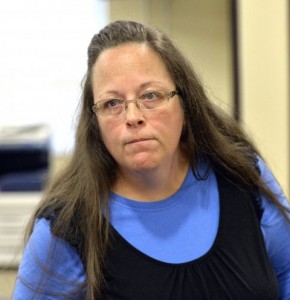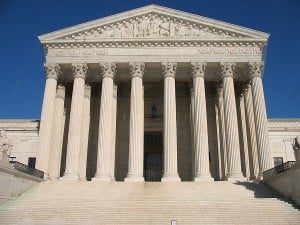 “We’re offering prayers of thanksgiving,” said Paul Undlin, senior pastor of Hosanna-Tabor Lutheran Church. “This whole thing has been a weight on my shoulders. It’s been a cloud over my ministry, over the whole church.”
“We’re offering prayers of thanksgiving,” said Paul Undlin, senior pastor of Hosanna-Tabor Lutheran Church. “This whole thing has been a weight on my shoulders. It’s been a cloud over my ministry, over the whole church.”
He was referring, of course, to the case of Hosanna-Tabor Church and School v. EEOC, the Supreme Court’s “ministerial exception” case which was decided this week by a landmark 9-0 vote.
He accepted congratulations on the Supreme Court’s ruling in favor of the church; and he expressed his relief that his time could now be spent, not poring over lengthy legal briefs, but on the work of the gospel.
* * * * *
 All eyes are focused this week on Hosanna-Tabor Lutheran Church in Redford, Michigan. Hosanna-Tabor Church and School v. EEOC is, by some estimations, the most important religious-freedom case to reach the Supreme Court in the history of our country; and the generosity and deeply Christian perspective of the ministry staff at Hosanna-Tabor was truly an inspiration.
All eyes are focused this week on Hosanna-Tabor Lutheran Church in Redford, Michigan. Hosanna-Tabor Church and School v. EEOC is, by some estimations, the most important religious-freedom case to reach the Supreme Court in the history of our country; and the generosity and deeply Christian perspective of the ministry staff at Hosanna-Tabor was truly an inspiration.
Hosanna-Tabor Lutheran Church is a small community church affiliated with the Lutheran Church-Missouri Synod. According to Pastor Paul J. Undlin, there are about 250 members; and typically, 163 of them worship at the church each Sunday. Pastor Paul, as he prefers to be called, has been at the church for 3½ years (since June 2008), and so was not present at the time of Cheryl Perich’s employment, nor was he involved in her dismissal.
 Still, Pastor Paul explains that the flurry of briefs that crossed his desk, and the calls that came whenever the story appeared in the news, took a good amount of his time. He wanted to be sure that he and his staff were well prepared—that their words would convey the “right” message of truth and grace.
Still, Pastor Paul explains that the flurry of briefs that crossed his desk, and the calls that came whenever the story appeared in the news, took a good amount of his time. He wanted to be sure that he and his staff were well prepared—that their words would convey the “right” message of truth and grace.
He wanted to be sure, too, that they did not speak ill of the former teacher who had opposed them in the court fight. “She was ill used by the EEOC,” Pastor Paul explained. “She was taken advantage of by them. They have dragged her along on this seven-year journey, as well.”
 He was grateful for the case’s resolution: The Obama Administration’s over-reaching was ruled unconstitutional by a unanimous 9-0 ruling by the Supreme Court of the United States. “How often,” Pastor Paul asked, “has the Supreme Court been unanimous?” He pointed out, though, that it was to be expected. “You don’t have to look far into the Constitution to see the ministerial exception!” he avered.
He was grateful for the case’s resolution: The Obama Administration’s over-reaching was ruled unconstitutional by a unanimous 9-0 ruling by the Supreme Court of the United States. “How often,” Pastor Paul asked, “has the Supreme Court been unanimous?” He pointed out, though, that it was to be expected. “You don’t have to look far into the Constitution to see the ministerial exception!” he avered.
The first few words of the First Amendment would, in fact, seem to support his view:
Congress shall make no law respecting an establishment of religion, or prohibiting the free exercise thereof.
THE CASE AGAINST HOSANNA-TABOR CHURCH AND SCHOOL
Well, actually, make that simply “Hosanna-Tabor Lutheran Church.” The school actually closed three years ago—merging its elementary program with that of another school, and making the reinstatement of former fourth grade teacher Cheryl Perich a moot point.
Perich, according to court documents, began her employment at Hosanna-Tabor School in 2000 as a lay teacher; but upon completion of a program of theological study at Concordia College, she was invited to become a “called” teacher, a member of the ministry team. Perich accepted their call; as a member of the ministerial team, she taught classes, taught religion, and led worship services. She became ill, however, early in the 2004-2005 school year, eventually being diagnosed with narcolepsy; and the school contracted with a lay teacher to replace her for the year. When Ms. Perich announced in January that she was ready to return to the classroom, she was not welcomed back by the school, now under contract with another teacher.
Perich did not take the news well, even when the school offered to cover part of her health insurance costs. She threatened to sue—but the confrontation backfired and the parish, displeased with her attitude, rescinded her call and her employment was formally terminated on April 11, 2005.
In the case, she had not sought to be reinstated; since the school no longer exists, that was never an option. She did, though, hope to receive back wages, punitive damages and other benefits.
A small church like Hosanna-Tabor Lutheran had little hope of raising the funds necessary, had the Court ruled in favor of the plaintiff. Pastor Paul admitted that had they lost, the church would have been forced to close. The ministry would have simply disappeared.
THE OBAMA ADMINISTRATION’S RECORD OF OBSTRUCTING RELIGIOUS LIBERTY
Since the start of the Obama Administration, the federal government has been pushing, demanding, inserting itself into the private affairs of the churches.
 Bishop William Lori, testifying before the House Judiciary Committee in October 2011, cited recent examples of government usurpation of the rights of religious institutions:
Bishop William Lori, testifying before the House Judiciary Committee in October 2011, cited recent examples of government usurpation of the rights of religious institutions:
- In August, the U.S. Department of Health and Human Services issued regulations to mandate coverage of contraception (including abortifacients) and sterilization as “preventive services” in almost all private health insurance plans. There was an exception for certain religious organizations; but the exemption was so narrow that few would qualify—and the exception does nothing to protect the conscience rights of insurers or individuals.
- In May 2011, HHS added a new requirement to its cooperative agreements and government contracts for services to victims of human trafficking and to refugees who are unaccompanied minors. Under the new policy, highly qualified service providers (such as the USCCB’s Migration and Refugee Services) were barred from participation in the program because they could not in conscience provide the “full range” of contraceptive services—namely, abortion and contraception.
- The State Department’s U.S. Aid for International Development (USAID) is increasingly requiring contractors, such as Catholic Relief Services, to provide comprehensive HIV prevention activities (including condom distribution), as well as full integration of its programs with reproductive health activities (including provision of artificial contraception) as part of their international relief and development programs. Under this new requirement, some of the most effective providers helping to prevent AIDS inAfrica and other developing nations will be excluded.
- The federal Department of Justice (DoJ) has ratcheted up its attack on the Defense of Marriage Act (DOMA), which was passed during the Clinton Administration in 1996, by mischaracterizing it as “bigotry.” In March 2011, the DoJ stopped defending DOMA against constitutional challenges; and in July, the Department began filing briefs attacking DOMA’s constitutionality, claiming that supporters of the law could only have been motivated by bias and prejudice.
- The Department of Justice also sought to undermine religious liberty in the critically important “ministerial exception” case, Hosanna-Tabor v. EEOC. The Department of Justice could have taken the position that the “ministerial exception,” though generally providing strong protection for the right of religious groups to choose their ministers without government intrusion, didn’t apply in the case before the court. Instead, the DoJ attacked the very existence of the exception, in opposition to a vast coalition of religious groups urging its preservation through their amicus curiae briefs.
Religious liberty has been in the crosshairs at the local level, too, with the redefinition of marriage.
- In New York, county clerks faced legal action for refusing to participate in same-sex unions, and gay rights advocates boast how little religious freedom protection individuals and groups will enjoy under the new law.
- In Illinois, Catholic Charities has been driven out of the foster care business because it recognizes the unique value of man-woman marriage for the well-being of children.











